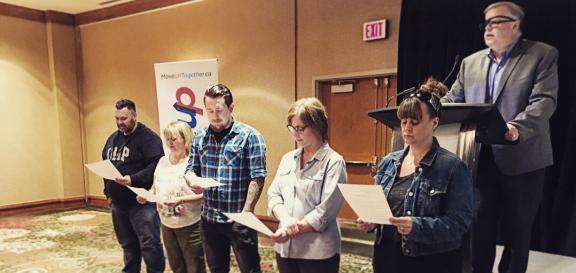At the May council meeting MoveUP councillors had the chance to deepen their understanding of governance, discussed reconciliation with First Nations communities and heard reports back on the ongoing efforts to calibrate Vice-President pay.
As always, the council meeting started by swearing in the new members of the executive council. After being sworn in, each took to the mic to introduce themselves. The new councillors all expressed their willingness to add their efforts to the goals of the union and help out however they could.
During the Communications report, Communications Director Sage Aaron spoke about the campaign to fight for our members at D.A. Townley. D.A. Townley was bought by Pacific Blue Cross (PBC) over a year ago, and now they are trying to fold MoveUP’s members into their CUPE bargaining unit. MoveUP is fighting to keep its members through a two-pronged approach: arguing for them at the Labour Board and by making appeals to the PBC board of directors. For the appeal Aaron has been taking photos and conducting interviews with D.A. Townley members on what being a MoveUP member means to them.
During the President’s report David Black touched on the growing consensus among BC Federation of Labour table officers to see Irene Lanzinger and Aaron Ekman sit as president and secretary-treasurer of the Fed for another term. He also reported out on a meeting with BC NDP MLA Jane Shin. MoveUP was an enthusiastic supporter of Shin’s election campaign and she called the meeting to give Black and Secretary-Treasurer Lori Mayhew a detailed update of her work since being elected.
Following that, Black turned to the postponed reconciliation event to discuss whether the event would go forward. The event will offer MoveUP councillors an opportunity to talk with First Nations people about the impact of colonialism, and ways in which First Nations and settler people can work together to reconcile and build a future together.
Executive board member, and Haida Nation member, Joyce Galuska got up to the mic and spoke about her experiences as a reconciliation facilitator. “Reconciliation is uncomfortable,” she said. “When you’re there I can’t guarantee you aren’t going to hear stories [about abuse and the legacy of residential schools] but you will also hear from First Nations people who want to move forward with non-aboriginal people in reconciliation.”
“What we want is insight and understanding and for us all to come to terms with the fact that reconciliation is not a first Nations issue, it is a Canadian issue,” she explained. After some debate from the floor the executive council voted with a strong majority to go ahead with the reconciliation event.
During the Vice-President’s reports, Gwenne Farrell announced that the union and BC Hydro had finally reached an agreement whereby the Field Service Representatives would be leaving Accenture and coming back into BC Hydro. She also spoke about the worksite visits to B.C.’s north, including Hudson’s Hope. There exec councillor Doug took Gwenne’s delegation around the office despite it being his day off.
During the COPE SEPB National report David Black offered context on a resolution that would be hitting the floor regarding equity seats on the national executive. There will be a proposal to amend the national convention to ensure greater diversity and equity. This proposal is the result of a process which involved canvassing other unions and organizations for best practices. The change would mean the formation of a Canadian Equity Council, a consultative body that would meet before or after the National conference and convention and consist of national committee members at up to four persons per region who are aboriginal, racialized workers, members of the LGBTQ community, workers living with disabilities and young workers.
Gwenne Farrell also spoke to the National report to inform council that there will be a proposal to go to different national dues structure. Currently National payments are on a per member basis. The change calls for a flat percentage which would push MoveUP’s contributions up significantly. Unsurprisingly, council voted against the National motion.
Farrell then turned to the Global Union Federation report, and gave details about the recent IndustriALL. IndustriALL is restructuring its dues which had been unchanged since the merger which birthed the global union four years ago. There is also an ongoing difficult conversation about women’s representation on the executive committee. Farrell also sits as co-chair of IndustriALL’s Women’s Committee. “Bangladeshi garment workers are 75 per cent women,” Farrell said, explaining the need for a quota on the IndustriALL executive. “And how many women union leaders from Bangladesh are at this table? Zero.” Farrell went on to say she hoped the issue would be resolved before IndustriALL’s October convention.
After lunch, the council heard from leadership consultant Axel Hovbrender who focused his talk on effective governance. Hovbrender spent 35 years with the Vancouver Police Department, and many years on boards, before launching his consulting career. He is also faculty at the Royal Roads University School of Leadership. He has worked with police boards, several elected boards and First Nations including the Nisga’a. He took the council through a series of exercise which asked questions like “Who are you responsible to, and who are you accountable to?” He explored the areas in which the answers to these questions were in conflict and suggested paths for resolution. He also took the council through a deep dive governance concepts including “due diligence”, “duty of care” and “duty of loyalty”. Hovbrender also emphasized the need for the elected representatives to work in partnership with staff to ensure the best outcomes for the union’s members.
The last big item on the agenda was a report out by the compensation committee. They had been tasked with reviewing the Vice-Presidential compensation (currently based on the wage the VPs would earn from their employers if at work). They gave details about the work they had done so far to put together a framework for the VP compensation review, and asked council for a budget for further meetings they deemed necessary. Council debated then agreed to fund the budget.



